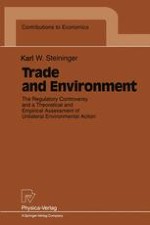Even though the interlinkage between trade and environment is obvious and important, it has been acknowledged as such only recently by the world community. Yet it is far from being truly addressed, as is indicated by the negotiations up to the Uruguay Round Final Act, signed in April 1994, as the most current example. Mankind remains faced with the crucial need of addressing this interlinkage -the objective to which this report is devoted. My own growing interest in this subject and the choice to work on and publish this report, which has been defended as my Ph.D. dissertation at the University of Vienna, has had a long personal history. Ultimately it was made possible by important teachers of mine -from primary and high school up to universities -, by colleagues and friends, but certainly also by my family -as each of them answered my questions and communicated their own ideas. Along the path of research it was only the specific support and inspiration of a large number of people in various different ways that made it possible for the report to now be in front of you in the current form.
